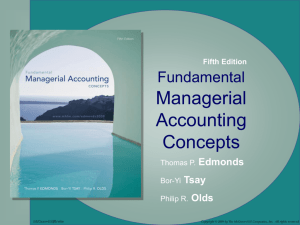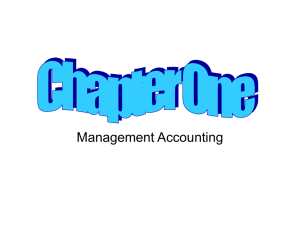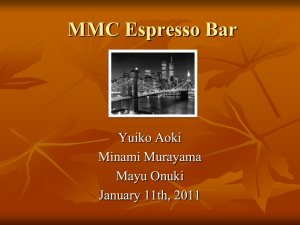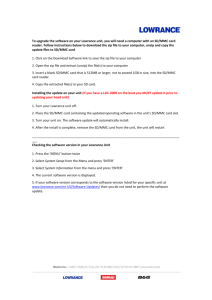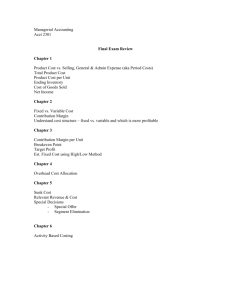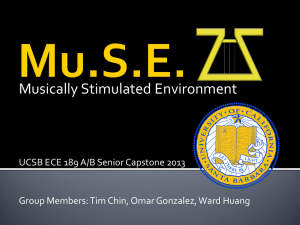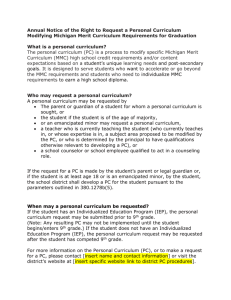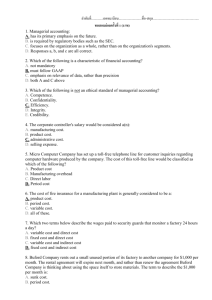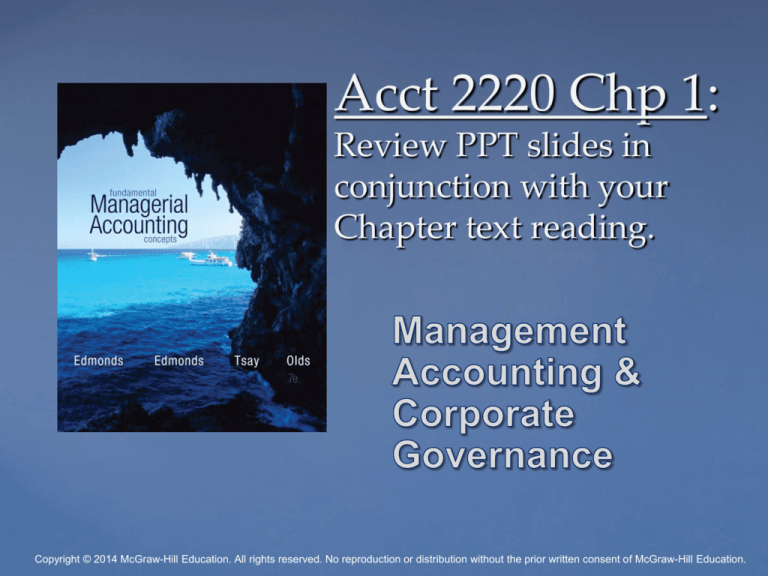
Acct 2220 Chp 1:
Review PPT slides in
conjunction with your
Chapter text reading.
{
Copyright © 2014 McGraw-Hill Education. All rights reserved. No reproduction or distribution without the prior written consent of McGraw-Hill Education.
Learning Objective
Distinguish
between
managerial and
financial
accounting.
LO1
1-2
1-3
1-4
Learning Objective
Identify the cost of
manufacturing a
product and show how
these costs affect
financial statements.
LO2
1-5
Components of Product Cost
Materials
Labor
Overhead
1-6
1-7
Average Cost per Unit
Total Cost
Number of Units
= Average Cost per Unit
For example, Average Cost Per Unit
$1,000
4
= $250
1-8
Costs Can Be Assets or
Expenses
Product
Cost
Period
Cost
Asset
COGS
Expense
1-9
1-10
1-11
Labor Costs
1-12
Overhead Costs
1-13
Total Product Cost
1-14
1-15
Overhead Costs: A Closer
Look
Indirect Costs
Depreciation
Supervisor’s
Salary
Utilities
1-16
Indirect Cost Allocation
1-17
Manufacturing Product Cost Summary
Direct
Materials
Direct
Labor
Raw material
costs that can
be easily traced
to products.
Factory wages
that can be easily
traced to products.
Manufacturing
Overhead
Other factory costs
such as indirect
materials and labor,
utilities, rent, security,
and depreciation.
1-18
Product Costing in Service and
Merchandising Companies
Service
Companies
Merchandising
Companies
Provide products to
customers that are
consumed immediately
Sell products other
companies make
Service and merchandising companies also incur labor
and overhead costs. However, these costs are normally
treated as general, selling and administrative expenses
rather than accumulated in inventory accounts.
1-19
Learning Objective
Show how just-in-time
inventory can
increase profitability.
LO3
1-20
Just-in-Time
Many businesses have been able to simultaneously
reduce their inventory holding costs and increase
customer satisfaction by making products available justin-time (JIT) for customer consumption.
For example, hamburgers
that are cooked to order
are fresher and more
individualized than those
that are prepared in
advance and stored until
a customer orders one.
1-21
Costs of having inventory....
Obvious
Hidden
Decreased
Motivation
Sloppy work
Supervision
Theft,
damage,
obsolescence
Financing and
Warehouse
Space
Increased
Production
Time
1-22
Learning Objective
Identify the key
components of
corporate
governance.
LO4
1-23
Corporate Governance
Corporate governance is a set of relationships between
the board of directors, management, shareholders,
auditors, and other stakeholders that determine how a
company is operated.
Management
Board of Directors
Auditors
1-24
The Motive to Manipulate
Strong Financials
Weak Financials
Promotions
Pay raises
Bonuses
Stock options
Passed over for promotions
Demoted
Fired
1-25
Marion Manufacturing
Company
Marion Manufacturing Company (MMC) had the
following transactions:
1. MMC was started when it acquired $12,000 from
issuing common stock.
2. MMC incurred $4,000 of costs to design its
product and plan the manufacturing process.
3. MMC incurred specifically identifiable product
costs of $8,000.
4. MMC made 1,000 units of product and sold 700 of
the units for $18 each.
Let’s look at two scenarios for MMC.
1-26
Marion Manufacturing Co.
* Important Distinction here! *
Scenario 1
Scenario 2
The $4,000 of design
and planning costs
are classified as
selling and general
and administrative.
The $4,000 of design and
planning costs are
classified as product
costs, meaning they are
first accumulated in the
inventory account and
then expensed when the
goods are sold.
1-27
1-28
Ethical Considerations
Certified Management Accountants are
guided by the IMA Statement of Ethical
Professional Practice
The statement provides standards on
Competence
Confidentiality
Integrity
Credibility
Resolution of ethical conflict
1-29
Common Features of Criminal
and Ethical Misconduct
Opportunity
Fraud
Triangle
Pressure
Rationalization
1-30
Internal Control Practices
Hiring
Competent
Personnel
Separating
Duties
Establishing
Clear Lines of
Authority &
Responsibility
Requiring
Extended
Absences
Using
Prenumbered
Documents
Bonding
Employees
Establishing
Physical
Controls
Performing
Evaluations at
Regular
Intervals
1-31
Sarbanes-Oxley Act of 2002 Four Significant Components:
Internal
Controls
CEO and
CFO
Certification
Code of
Ethics
Hotline for
Anonymous
Reporting
1-32
End of Chapter 1
1-33

